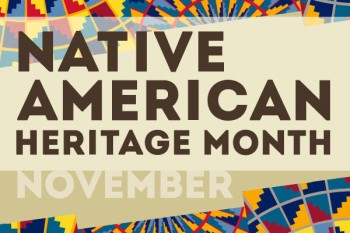Native American Heritage Month: Tribal Youth and Juvenile Justice

By Kelbie Kennedy, Policy Counsel, Choctaw Nation of Oklahoma, National Congress of American Indians
During Native American Heritage Month we recognize the diverse cultures, languages, histories, and traditions of all 573 American Indian and Alaska Native governments in the United States. According to the U.S. Census Bureau, in 2017 over 6.8 million people identified as American Indian or Alaska Native and one in every three is under the age of 18. With such a young population, federal laws surrounding juvenile justice have a large impact on tribal youth who are disproportionally represented in the system.
Tribal youth are three times more likely to be incarcerated than white youth and are twice as likely to be petitioned for a status offense. The juvenile justice system often re-traumatizes tribal youth and is unable to provide them with culturally appropriate support.
At a recent Senate Indian Affairs Committee hearing, Senators examined a key issue that tribal nations, organizations, and allies have pointed to time and again—the lack of consistent reporting on tribal youth in the juvenile justice system. A 2018 GAO report confirmed that several states do not collect data on tribal youth in their juvenile justice system. Additionally, the report revealed there is no consistent tracking of tribal youth in the federal justice system. The latest Department of Justice (DOJ) of decreasing the number of disproportionate minority contacts (DMC) that states must report has only compounded this growing issue. Federal, state, and tribal policy makers cannot adequately address the many issues surrounding tribal youth in the juvenile justice system if there is no reliable data available. Professor Addie Rolnick testified that simply asking youth “what is their tribal affiliation” and reporting their answers could help solve the issue however, the recent DOJ DMC reporting changes include no such question.
Tribal nations have implemented culturally appropriate programs for their youth to divert them from the juvenile justice system or help in rehabilitation. These culturally appropriate programs are as distinct as the nations’ themselves ranging from school attendance achievement programs (Pasca Yaqui Tribe), and traditional healing to wellness courts (White Earth Nation), to teaching traditional methods of gardening (Mississippi Band of Choctaw Indians). Each program is tailored to the culture of the nation and the specific needs of their youth. However, tribal nations are unable to provide these services to their youth when they are not notified when tribal youth are in the juvenile justice system.
The Juvenile Justice and Dequincy Prevention Act (JJDPA) (S.860/H.R. 6964) and the Tribal Law and Order Act (S. 2920) would ensure continued funding for juvenile justice programs and services that are vital to the tribal youth. Together, the bills would create additional alternatives to detention programs to assure that tribal youth are not re-traumatized through needless incarceration. The JJDPA would also strengthen the DMC core protection by providing clear direction to states and localities to plan and implement data-driven approaches to ensure fairness and reduce racial and ethnic disparities, to set measurable objectives for disparity reduction, and to publicly report such efforts. While neither bill in its current form addresses all of the concerns raised by tribal nations, tribal organizations, and advocates, passing both bills is a first step in a collaborative effort to build a better path forward for tribal youth across the United States. With less than two weeks before the 115th Congress adjourns, it is critical they act now to pass these important pieces of legislation. Contact your member today and urge them to take action to support and protect tribal youth.

